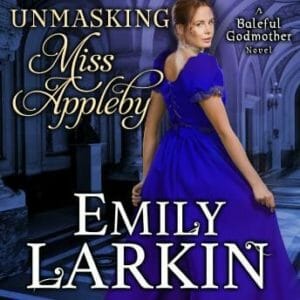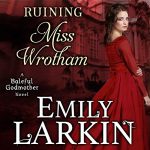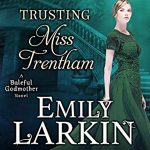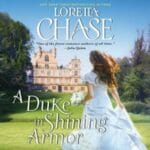Emily Larkin’s Unmasking Miss Appleby was one of my favourite books of 2016. It’s the first in the author’s Baleful Godmother series of historical romances with a magical twist – which is very cleverly incorporated into the story. If you’re looking for a high-concept paranormal romance, then you’ll need to look elsewhere, because that’s not what this is. What it IS, however, is a well-written, strongly characterised and thoroughly enjoyable historical romance set very firmly in the Regency London with which fans of historicals are familiar. And added to all that, the cherry on top of the icing on the cake is the extremely accomplished performance by Rosalyn Landor (actually, does she ever give anything other than an extremely accomplished performance?!) – who once again demonstrates why she’s Numero Uno when it comes to narration in historical romance.
After the death of her parents, Charlotte Appleby was – very begrudgingly – taken in by relatives who treat her little better than a servant, and while she longs for independence, she knows that a life of drudgery awaits her. But on the evening of her twenty-fifth birthday, she receives an unexpected visitor in the form of a woman who introduces herself as her Faerie Godmother and tells Charlotte that she has come to bestow a magical gift upon her, a gift earned by an ancestress centuries ago as payment for a valuable service rendered. Charlotte at first can’t believe her ears – there are no such things as faeries, after all – but when the woman reveals that Charlotte’s mother had received a gift on her twenty-fifth birthday, and tells her more about the sorts of powers she can grant, Charlotte starts to think that perhaps there’s something in her talk of magical abilities and gives some thought as to what gift she wants. She realises that this could be her chance for independence and decides on the ability of transformation, reasoning that as a man, there will be many, many more opportunities open to her than there will as a woman. With this in mind, she sets out to secure employment, and applies for a position as a secretary in London.
Her application is successful, mostly because there are no other applicants for the position of secretary to the Earl of Cosgrove following a violent attack a few nights earlier, which left his previous secretary badly injured. For some time now, the earl – a widower – has been the subject of an anonymous campaign of victimisation; vicious rumours circulate that accuse him of mistreating his late wife, and there are even whispers he murdered her; his house is being vandalised almost nightly, piles of shit are regularly left on the doorstep and now, whoever is behind all these outrages seems to have stepped up their campaign against him by resorting to violence. Cosgrove is a high-profile and very vocal abolitionist and thinks it most likely that his political opponents are responsible for both the vandalism and the attack, although his good-for-nothing heir – who hates him – and his late wife’s brother – who hates him – also have reason to want to do him harm.
Chicks-in-strides is probably my least-favourite trope of them all because I find it really difficult to believe that nobody is able to tell that the heroine isn’t a man. Here, however, Charlotte is able to become a man, so there’s none of that breast-binding or learning how to walk with a manful stride that so often crops up in those stories where the heroine disguises herself as a chap. Charlotte’s transformation into Christopher Albin also affords the author a fantastic opportunity to develop a real friendship between her hero and heroine, and also to make some nicely-judged social observations, not only about the limited options open to women at the time, but also on the way the sexes interacted.
The relationship that develops between Cosgrove and Charlotte – as Albin – is delightful. The earl takes the younger man under his wing in the manner of an older brother and talks frankly to her about various matters – including women and sex – which affords Charlotte a glimpse into the male psyche she could never have gained as a woman. She also gets to experience the confidence and freedom conferred on half of the population simply because they were born with a penis.
But of course, that appendage eventually proves problematic when it starts to sit up and take notice whenever Charlotte’s handsome employer is around. She’s never experienced feelings of attraction or desire before and doesn’t know what to do with them; she fears that if she can’t conquer them, Cosgrove will notice her reaction to him and dismiss her. Then she remembers something he once said about the need men often feel to scratch an itch – and what to do about it. So she conceives a bold plan designed to get him out of her system so she can continue to work alongside him.
The romance is beautifully developed, and Ms. Larkin does a splendid job of showing Cosgrove and Charlotte – as herself – falling in love through a series of meetings that begin as one thing and slowly morph into another. Cosgrove is a gorgeous hero – sexy, intelligent and honourable – and Charlotte plays her dual roles wonderfully; as Albin, she’s a truly supportive friend and confidante, and as Charlotte, she’s the woman with whom Cosgrove shares tenderness and pleasure.
The two plotlines – the romance and the story surrounding the identity of those out to destroy Cosgrove – are superbly woven together, and while the magical element is fairly low key, the author doesn’t just forget about it once she’s inserted Charlotte into Cosgrove’s life, and her transformative abilities play a key role in the search for his enemies. My one niggle about the story is to do with the ease with which Cosgrove accepts Charlotte’s ability to transform herself, but that’s really my only criticism.
I can’t level any criticisms at the narration however, because Rosalyn Landor delivers a(nother) flawless performance. Every single character, from the principals down to the smallest of bit parts, is voiced appropriately according to gender, age and station, and there is never any confusion as to who is speaking during multi-character conversations, or as to whether she is reading narrative or dialogue. Her portrayals of the principals – Charlotte, Albin and Cosgrove – are all excellent; I was particularly interested to hear how she would voice Albin, as it was important for him to sound masculine but to somehow be recognisably Charlotte, and she achieves this perfectly, varying tone and timbre to create the image of a slightly naïve yet determined and fiercely loyal young man. Ms. Landor is particularly adept at portraying aristocratic heroes, giving them just the right amount of hauteur while at the same time imbuing them with those qualities we all look for in a romantic hero, and her portrayal of Cosgrove is particularly good. There’s real warmth and affection coming through in his scenes with Albin and Charlotte, which contrasts strongly with the steely implacability he displays when confronting his enemies. It’s an accomplished, nuanced, emotionally resonant performance, and I honestly can’t fault it.
In Unmasking Miss Appleby, Emily Larkin takes an unusual premise and skilfully combines it with a well-thought out plot and a deliciously sensual romance to create a compelling, quirky and charming story. Rosalyn Landor’s expert narration brings the tale vividly to life and I really hope that the rest of the Baleful Godmother series will eventually be released in audio format.
Caz
Buy Unmasking Miss Appleby by Emily Larkin on Amazon




